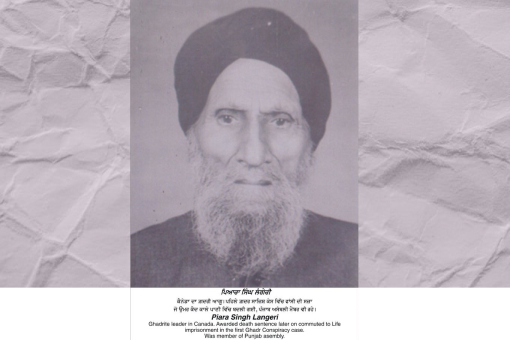
Piara Singh Langeri’s photo in Desh Bhagat Yadgaar Hall, Jalandhar
Piara Singh was a ghadarite revolutionary who was sentenced to death for his anti-British activities. He was born on 15 January 1881 in Langeri village of Hoshiarpur district in Punjab. His father, Lakha Singh, was a marginal farmer. In 1902, he joined the British Indian Army's 29 Platoon. Piara Singh resigned from the army after four years of service and decided to move to the United States of America.
In 1906, he boarded a ship from Calcutta to San Francisco with some other youngsters from his village. He worked at various jobs in California before moving to Canada. Here, he met Sant Teja Singh, Balwant Singh, and Sunder Singh, Vancouver's leading moderate Sikh leaders. These men formed the Guru Nanak Mining and Trust Company, and he was appointed as its Managing Director. He was appointed chief priest of the Victoria Gurdwara in 1912. William Hopkinson, a British intelligence officer, attempted to influence him and use him as an informant, but he refused. He and Dr. Sunder Singh founded a fortnightly paper Sansar in Victoria to raise the immigrant community issues. On May 23, 1914, the Komagata Maru ship (Guru Nanak Jahaz) arrived in Vancouver. Piara Singh and other prominent Sikhs attempted to board the ship. He helped to raise funds, food, and other necessities for the passengers.
On 29 August 1914, he boarded the S.S. Korea bound for India. On the way, he disembarked in Japan at Nagasaki and moved on to Shanghai. He preached sedition among the Indians there. On 15 October 1914, he arrived in Calcutta under the guise of Karam Singh. He managed to avoid arrest. In his village, he lectured against British rule. He also went to Bannu Cantonment to preach sedition among the Indian troops. Soon after, police came to know about him and raided his home. He went underground.
Following the failure of the Ghadar uprising, he was arrested in Banga on April 12, 1915, and charged in the Lahore Conspiracy Case. The trial began on April 26, 1915, and ended on September 13, 1915. Piara Singh was sentenced to life imprisonment and property forfeiture under sections 121, 121 A, and 326. While serving his sentence in Rawalpindi Central Jail, he attempted to flee with Jawala Singh Tathian, Inder Singh, Roda Sungh, and Jamna Das. In March 1920, the British government announced a Royal Clemency. He was granted conditional release after serving four and a half years in Cellular Jail. Following his release, he joined the Central Sikh League and actively participated in the Gurdwara Reform Movement. He was elected to the Shiromani Gurdwara Parbhandak Committee. At the same time, he was in contact with Sikh revolutionaries in other countries and receiving financial assistance from them. Piara Singh's home became a safe haven for ghadarites to live and meet. After breaking the jails, important Ghadar Party leaders such as Master Udam Singh Kasel and Gurmukh Singh Lalton paid him a visit. He assisted them in moving to Afghanistan.
He was elected President of the American-Canadian Society in 1921. The goal of this society was to establish national educational institutions in Doaba and to publish a revolutionary newspaper in the lines of the 'Ghadr.' He established a Pardesi Khalsa newspaper under its auspices. In 1923-24, he aided the Babbar Akalis in their murderous campaign against loyalists in the Doaba. In 1923, he took part in the Jaito Morcha, which was organized by Akalis to protest against the forceful abdication of Maharaja Ripudaman Singh. While participating in the Morcha, he was arrested. In 1926, he was released along with moderate Sikh leadership.
His friend Kapoor Singh invited him to Canada in 1928. He was here for about two years. He discussed with Ghadar Party members a plan to acquire arms for use in an armed revolt in India. On April 13, 1929, at a meeting in Victoria Gurdwara, he exhorted everyone present to sacrifice everything for the emancipation of the motherland. The Vancouver Gurdwara Committee gave him a hearty farewell. Piara Singh, despite joining Akalis, had a soft corner for communists and Kirti-Kisan Party workers. During WWII, he was imprisoned in Dharamsala's Deoli Camp. In 1946, he was elected to the Punjab Legislative Assembly from Mahilpur. He remained unmarried. After a brief illness, Piara Singh passed away on September 18, 1971, in Garhshankar's Panam village.